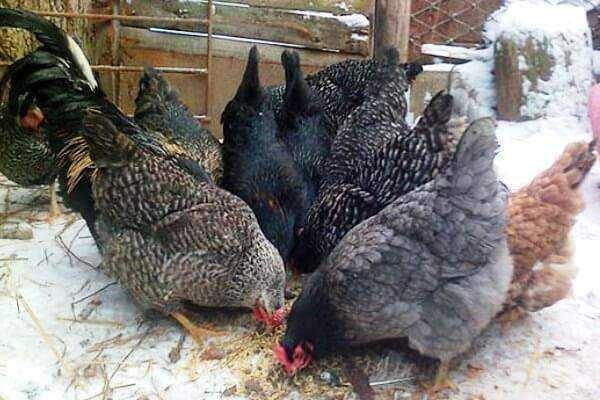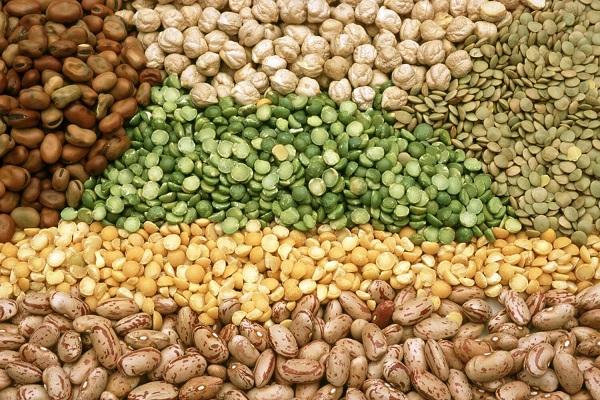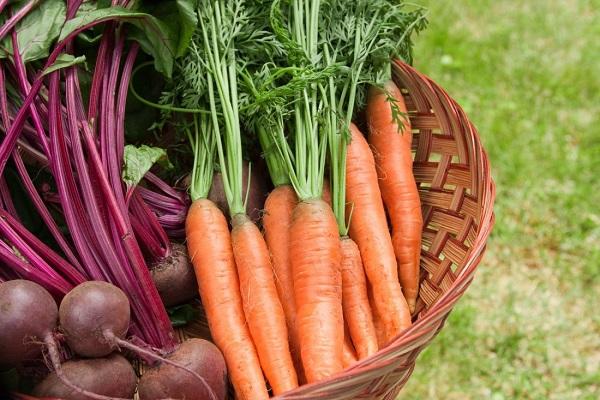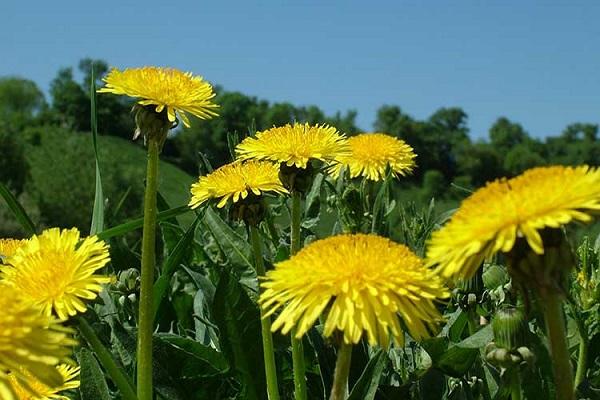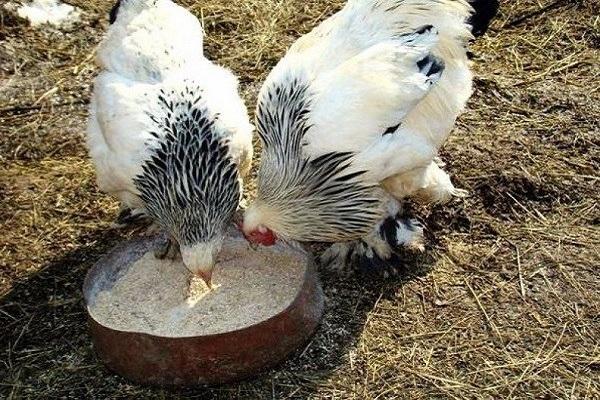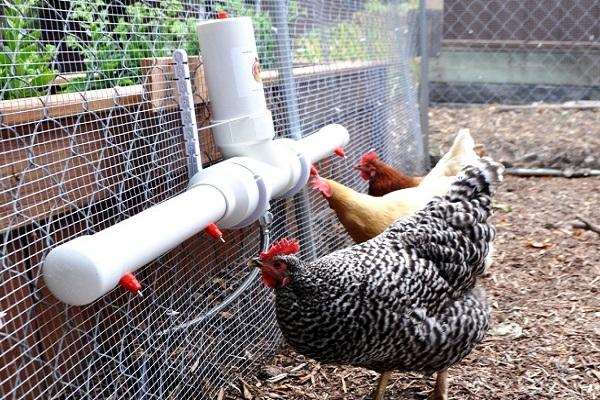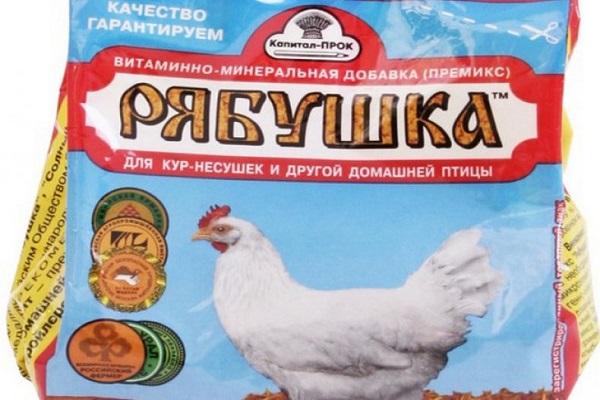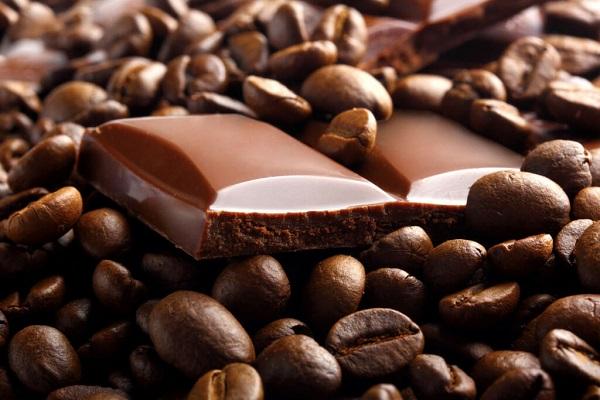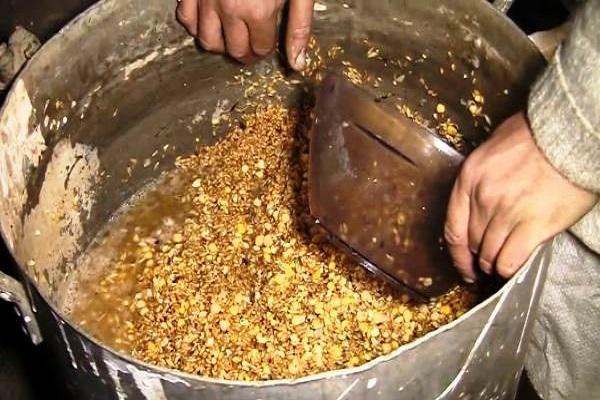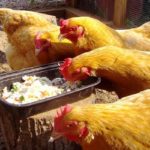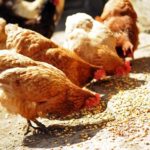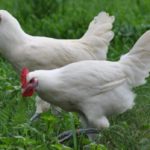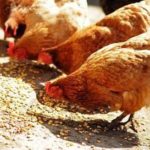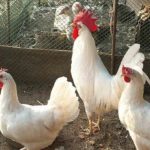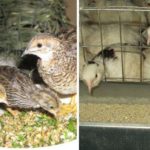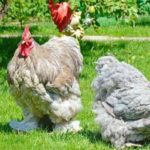With the arrival of cold weather, many farmers are faced with problems in selecting food for their pets. To prevent feathered animals from losing their feathers and losing their ability to lay eggs, comfortable conditions should be provided and the diet should be carefully selected. Therefore, the question arises: what to feed chickens in winter so that they lay eggs. Not only the quality, but also the quantity of food, as well as the frequency of feeding matters.
- Features of feeding laying hens in winter
- What to feed chickens in winter?
- Legume feed
- Roots
- Green food
- Coniferous components
- Animal food
- Gardening waste
- Mineral complexes
- Water
- Healthy Supplements
- Prohibited foods for chickens
- How to prepare feed for laying hens in winter?
- Using electric units for preparing feed
- What to feed to increase egg production in winter
Features of feeding laying hens in winter
In cold weather, it becomes difficult to care for birds due to the following factors:
- reducing the temperature in the chicken coop;
- decreased mobility of the bird itself;
- inability to independently replenish the level of protein food in the body.
The norm of nutrition in winter is 3-4 times a day. When switching to winter nutrition, it is important to follow the rules:
- In the morning, it is better to feed chickens with warm food.
- In the daytime, you can give compound feed by mixing table salt and chalk into it.
- In the evening, a mixture of different types of grains is optimal nutrition. The grain should be thoroughly crushed, since in this case the bird will not need to expend energy on swallowing and digesting food. A hearty dinner will help you stay strong and stay warm until the morning.
These simple feeding rules will help you avoid many problems.
What to feed chickens in winter?
The diet should be complete and varied. It must contain root vegetables, legumes, grains, herbs, mixed feed, mineral complexes and always a sufficient amount of water.
Legume feed
Since legumes contain protein and beneficial amino acids, they should be included in the diet to replenish poultry reserves. They should be given boiled. To cook, the beans should be soaked for a couple of hours and then boiled over low heat. In some cases, beans are added to the feed as grain. The chicken can absorb the heat-treated substance without much effort.
Roots
Root vegetables familiar to poultry also do not interfere with the diet. The best option would be potatoes. It is necessary for the formation of eggshells due to its high starch content.
Important! It is recommended to organize supplies of potatoes for birds in advance. It is enough to set aside small root vegetables that are not suitable for cooking.
In addition to potatoes, the following root vegetables should be included in the diet:
- Carrot. It can be grown in beds intended directly for growing crops for animal feeding. You can give preference to feed varieties. They are inferior in taste, but contain all the necessary substances.
- Beet. This crop is needed to feed birds, but storing fodder beets is quite problematic, since it dries quickly. Using a burlap covering will help correct the situation.
Adding several types of root vegetables will help improve egg production.
Green food
To obtain vitamins and fiber from food, domestic chickens should eat greens. Recommended plants for poultry:
- dandelion;
- alfalfa;
- quinoa;
- clover;
- nettle.
During frosts, these components are added in dry form as an additive to nutrient mash.
Coniferous components
Don't forget about pine flour. It is added to feed mixtures. Needles are necessary to keep birds in good shape during periods of weakened immunity. Providing feed with the necessary vitamins will increase the intensity of reproductive processes.
Animal food
To feed poultry in winter, it is recommended to introduce animal products into the diet. They are rich in beneficial amino acids necessary for the formation of eggs. The most accessible fermented milk products for poultry farmers are:
- cottage cheese;
- kefir;
- curdled milk.
You can also add meat and bone meal, fish and meat waste to the feed.
Gardening waste
Chickens thrive on garden waste.These could be rotten pears, apples, plums, which were placed in cellars for long-term storage. They are usually added to mash. Despite some defects, fruits do not lose vitamins and amino acids.
Mineral complexes
To replenish the mineral balance in the bird's body, feed additives are needed. Optimal: chalk, crushed shell rock, ash and eggshells. All of them are necessary for the reproductive function of the chicken. Table salt is also used as an additive. It contains large amounts of sodium and chlorine.
Water
No matter how high-quality the food is, feeding poultry is impossible without water. There should always be enough of it in the drinking bowls. Chickens independently regulate the amount of liquid they consume. They drink after every meal. In some cases, instead of water, snow is used in winter, which melts and becomes clean water.
Important! The water must be replaced regularly with clean water.
Healthy Supplements
For complete care, it is necessary to introduce special vitamin supplements into the diet. These can be ready-made mixtures offered by stores. They do not contain harmful growth hormones or preservatives, but they do contain amino acids, vitamins and minerals.
The following products can be vitamin supplements:
- dried kelp (seaweed). They saturate the yolk and strengthen the shell of eggs;
- fish oil is a storehouse of fatty acids necessary for birds;
- apple cider vinegar, to improve the quality of plumage and increase the overall tone of the bird;
- probiotics to enhance immune defense;
- berries (rose hips, hawthorn, red rowan) as a source of vitamins.
It is advisable to add baker's yeast to food. They promote weight gain and improve productivity.
These additives are given to birds in crushed form or mixed with dry food.
Prohibited foods for chickens
There is a certain list of foods that are harmful to laying hens. It includes:
- sausage products that can cause disorders of the cardiovascular system of poultry;
- milk - to avoid the development of dysbiosis;
- cheese. Its high fat content causes obesity, and spices and preservatives negatively affect the well-being of chickens;
- chocolate and coffee;
- alcohol, since birds cannot digest alcohol;
- compote - due to the harmful sugar content.
- oil, which is also not digested by the chicken’s body.
All these products are detrimental not only to the reproductive function of poultry, but also to its entire body.
How to prepare feed for laying hens in winter?
To save money, you can prepare food at home. First you need to choose the consistency of the future mixture. This can be dry food or mushy food. The basis of any of them is grain. The desired products are added to it: dry grass, vegetables and fruits, as well as bone meal, dairy products and vitamin supplements.
It is important to achieve the required consistency, which will not complicate the process of swallowing and digestion of the bird. To do this, use a crusher, grater or pruning shears. If necessary, the consistency of the feed can be alternated. This will make the poultry diet varied.
Using electric units for preparing feed
To prepare food of the required quality, you must properly chop the food. It is difficult to do this manually, therefore, if you have a large number of poultry, you should think about purchasing special equipment.An electric chopper is capable of crushing not only root crops, but also grains and legumes. The best is considered to be a unit with a two-phase motor. It is more powerful and will provide food for the entire livestock.
A steamer will become an indispensable assistant in the household. This is a device designed for preparing feed from food waste, greens and succulent feed. With its help, you can prepare healthy and high-calorie food in the shortest possible time.
What to feed to increase egg production in winter
In order for chickens to lay eggs in winter, it is necessary to supplement the diet with those products that are involved in the formation of eggs. It is not recommended to switch to grain feed only. It does not satisfy the full need for varied nutrition of laying hens, which is why their productivity decreases. The content of vitamins, minerals and amino acids should be approximately the same so that there is no deficiency of one of the elements.
Properly organized nutrition of laying hens in winter will ensure high egg production and help poultry maintain health at low temperatures. Don't forget about building a chicken coop. If it is sufficiently insulated, then the volume of food will not have to be increased.

